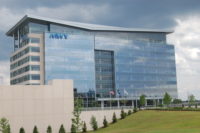It wasn't that long ago that BMW Constructors Inc., an Indianapolis builder known for down-and-dirty industrial projects, wasn't especially well known among up-and-coming talent in the region. "We were a quiet company," says Brian Acton, BMW president & CEO. "Growth was slow, safe, organic, our goal being to cultivate customers for life rather than chase growth across the country."
As such, the firm hammered hard at continuous improvement across key sectors, including petrochemical, power, food and beverage, and biopharmaceuticals. In all, 80% of its work involved repeat business.
Trouble was, top talent was hitching its wagon to brighter-shining stars. "People didn't know us," says Acton.
Then came what Acton describes as "the flywheel effect." On the strength of long-standing relationships with clients such as BP, ExxonMobil and Eli Lilly, revenue started to steadily rise. So did BMW's profile. Last year, regional revenue nearly doubled, to $470 million, as the firm concluded work on a re-refinery for Heritage-Crystal Clean in Indianapolis while engaging in the final phases of work on the multibillion-dollar modernization of a BP refinery in Whiting, Ind.
During its six years at Whiting, where BP plans to process heavy crudes to produce cleaner fuels, BMW deployed some 2,200 workers to perform mechanical work on the facility's sulfur units, crude units and cokers, including the installation of piping and boilers in addition to equipment setting.
"We're playing in a bigger sandbox now, one where there are more opportunities, bigger opportunities," says Acton. "That's the great thing about growth—industry members have gotten to know us and want to work with us. We're starting to attract great talent."
Now that the flywheel is spinning, it's up to Acton and his team of executives to manage it. "With growth has come the need to add more senior-level operations and management folk," says Chris Buckman, the firm's vice president of corporate construction.
BMW also embarked on a reorganization plan last year that frees up Acton to pursue business development. "Our greatest impediment to growth was me," says Acton, who assumed the reins of BMW in 2010, only to find himself immersed in day-to-day operational issues. "I knew I could no longer be the one making all the decisions," he says. "You can't operate a big company with a president who has his fingers in every pie."
Under the new structure, decision-making has been delegated among the firm's executive leadership and operations teams, which collectively oversee safety, finance, construction, marketing, information systems, human resources and pricing services. Executive team members continue to report to Acton, as do select members of the operations team.
The realignment "was a bold move, because we were breaking 60 years of tradition," says Acton. "Now I can focus on business rather than in business."




